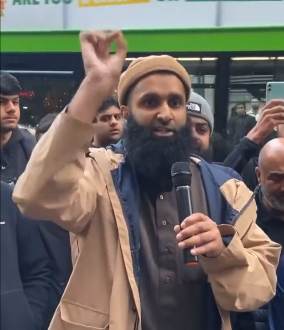This is a cross post from CIF Watch by Hadar Sela
The Guardian’s coverage of the riots and attacks on American and other Western diplomatic missions , as well as other targets, currently taking place throughout the Middle East and North Africa began on Tuesday, September 11th, with a video (sourced from Reuters) of what it termed ‘protestors’ at the US embassy in Cairo.
At 23:30 BST that night the Guardian published an article by Associated Press in Cairo on the events at the US embassy which also included the same video and raised the subject of the film supposedly responsible for triggering the riots. On Wednesday September 12th, the Guardian published another video, this time of the attack on the US Consulate in Benghazi, Libya in which, it later emerged, Ambassador Stevens and other US citizens were killed. The video’s strap-line declared that:
“The violence is in response to an unspecified American film protesters say is blasphemous”
By 11:09 am BST, the Guardian had gone from “unspecified American film” to declaring – in an article by AP – that the film’s director was Israeli.
Interestingly, here in the Middle East itself, there were no reports at that time of Israeli involvement in the making of the film: that notion appears to have been generated in the West, solely on the basis of the anonymous AP report, although the theme was later adopted by interested parties.
By Wednesday morning US time, (roughly three hours after the publication of the Guardian article) the Wall Street Journal – which had originally run the AP story suggesting Israeli involvement – was backtracking.
“On Wednesday, a records search turned up no references to any men in the U.S. by the name Sam Bacile. Israeli officials said they haven’t found any records of an Israeli by that name. The Journal was unable to reach the telephone number again and as of Wednesday, it had been disconnected.
The cellphone number used Tuesday was registered to a user at a home in Cerritos, Calif., where one of the residents was listed in public records as Nakoula Basseley Nakoula.”
By this time, other media outlets too had realized that the supposed Israeli connection to the film was a hoax. Even Al Jazeera had managed to get the story straight by early Wednesday morning.
” “Bacile” is now reportedly in hiding, even though reports suggest that the name is merely cover for a larger group, or a pseudonym for someone who may be neither Israeli nor Jewish – but who cited such an identify to inflame tensions.”
By Thursday, it was quite clear that there was no Israeli involvement whatsoever in the making of the film.
However, that inflammatory – and untrue – headline still stands at the Guardian – appearing, among other places, under the ‘Islam’ category in its ‘World News’ section.
Later on Wednesday, at 15:10 BST, the Guardian published another article by Caroline Davies, which repeated the same – and by then, obviously untrue – information regarding the film-maker’s supposed nationality.
At 15:35 BST, Julian Borger weighed in – also promoting the unproven involvement of “100 unnamed Jewish donors” in the making of the film and claiming that “Bacile still insisted that the movie would help Israel”.
At 16:55 BST on Wednesday, Glenn Greenwald joined the fray, also pushing the already discredited Israeli angle of the story. Two days later, an editor’s note was added to his article.
“Editor’s note: this article was amended on 14 September. The original stated that the producer of the film was Sam Bacile, an Israeli real estate developer living in California and that he had made the film with the help of 100 Jewish donors. This assertion was based on an Associated Press report that was published in Haaretz”.
At 20:00 BST on Wednesday, Julian Borger was back with a rehashed version of his earlier piece which still contained unnecessary speculations about Israeli and Jewish involvement in the making of the film. That piece is also still featured as “Top Story” on several of the Guardian’s ‘World News’ pages.
At 20:23 BST, the Guardian published an article by Rory Carroll, which was still pushing the “100 Jewish donors” line:
“Bacile wrote and directed the film purportedly with $5m (£3m) donated by 100 unnamed Jewish backers. The goal was to show “Islam is a cancer”, he told the Wall Street Journal.”
At 17:00 BST on Thursday, September 13th – well over 24 hours after the ‘Israeli connection’ to the film had been debunked – the Guardian rolled out veteran anti-Israel agitator Max Blumenthal (no stranger to online incendiary films himself) who, despite the fact that the story clearly lacked legs, wrote the following: (emphasis added)
“Bacile told the Associated Press that he was a Jewish Israeli real estate developer living in California. He said that he raised $5m for the production of the film from “100 Jewish donors”, an unusual claim echoing Protocols of the Elders of Zion-style fantasies. Unfortunately, the extensive history of Israeli and ultra-Zionist funding and promotion of Islamophobic propaganda in the United States provided Bacile’s remarkable statement with the ring of truth.“
Only at 18:44 BST on Thursday, September 13th did the Guardian begin to set the record straight with an article by Rory Carroll. But by that time, of course, millions of Guardian readers had been spoon-fed with 31 hours-worth of defamatory untruths.
There are several things which are deeply disturbing about the Guardian’s behavior on this story. One is the emphasis it has put on 14 minutes of puerile, badly produced hate speech as the ‘reason’ for the mass ‘rent a mob’ rioting throughout the Middle East and North Africa. That emphasis is particularly misguided and misleading in light of the fact that the attacks on the US missions in Cairo and Benghazi appear to have been pre-planned to coincide with the anniversary of the 9/11 attacks.
No less disturbing is the Guardian’s promotion of fictitious Israeli and Jewish involvement in the production of the film. Not only did the Guardian obviously fail completely to fact check the AP report it originally published, but even when the unreliability of that report came to light, it continued to push that version of the story because it dovetailed with the Guardian’s own existing prejudices.
If the West should have learned anything over the past few days, it is that rumour – however ridiculous and unfounded – can be a very dangerous and even lethal thing in this part of the world. Whilst some people at the Guardian may find it useful or amusing to promote unsubstantiated rumours which they have clearly not bothered to fact-check, that is not the type of reckless incitement one expects from a responsible, respectable or serious mainstream media outlet.
The Guardian must therefore promptly issue a prominent correction on each and every one of those articles citing, referring to or inspired by the irresponsible AP report, making it very clear that its reports were misleading, unfounded and untruthful.
If it has the necessary conscience and guts, the Guardian will also admit to gross professional negligence.




